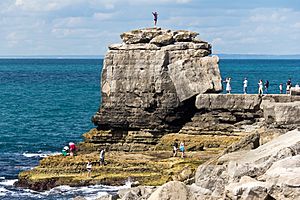Pulpit Rock, Portland facts for kids
Pulpit Rock is a famous rock formation at Portland Bill, the very southern tip of the Isle of Portland in Dorset, England. It looks like an open book resting on a stand, which is why it's called "Pulpit Rock."
Contents
How Pulpit Rock Was Formed
This unique rock wasn't made by nature alone. It was created in the 1870s by quarry workers. They were cutting away stone at Bill Quarry. They left this part of the rock standing. It used to be a natural arch. The quarrymen cut away the sides of the arch. This left the central pillar that we see today. Pulpit Rock is a reminder of the island's quarrying history. It is similar to Nicodemus Knob, another rock left behind by quarrying.
Why People Visit Pulpit Rock
Pulpit Rock is a very popular spot for visitors to the island. Many people come to take pictures of its unusual shape. It's a great place for photographers.
Fishing at Pulpit Rock
The area around Pulpit Rock is also popular for fishing. Anglers often come here to catch wrasse fish. In 1998, a British record Ballan wrasse was caught here by Pete Hegg. This shows it's a good spot for big fish!
The Rocks of Pulpit Rock
The rock layers at Pulpit Rock tell a story about the Earth. The lowest rocks, near the sea, are part of the Portland Cherty Series. These rocks contain a lot of chert, which is a very hard type of rock. Above these, you can see the Portland Freestone. This is a type of Portland stone, a famous limestone used for building. It's the same kind of stone that was quarried nearby. On top of Pulpit Rock, there are thinner layers of limestone. These are part of the Purbeck Formation.


